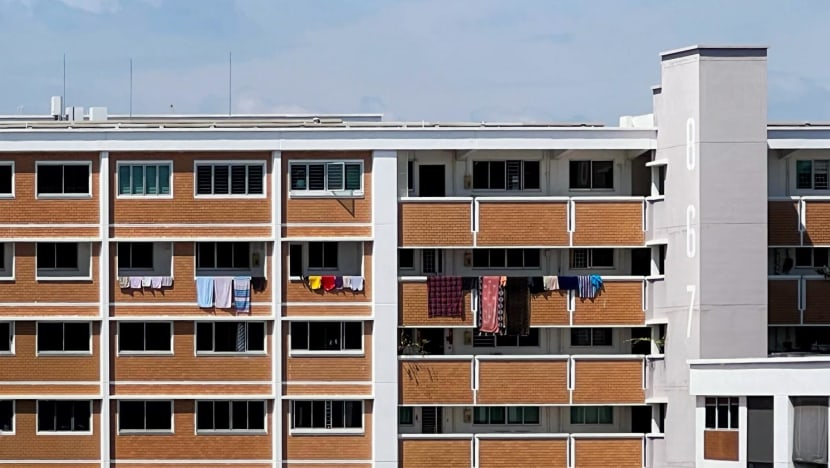With rising resale prices, is HDB's lease buyback scheme a good option for seniors?
For seniors with older or smaller homes, the lease buyback scheme may be a better option than selling their flat, an SUSS associate professor says.

HDB flats in Singapore. (File photo: iStock)

This audio is generated by an AI tool.
SINGAPORE: The Lease Buyback Scheme offered by the Housing and Development Board (HDB) remains relevant even in a buoyant resale market where flat prices have seen steady growth, analysts said.
Particularly, it offers the option of “flexibility” to those who wish to age in their own homes but need extra funds for their retirement nest egg, they added.
Launched in 2009, the scheme allows those aged 65 and older to sell part of their flat’s lease back to HDB.
Those eligible can choose to retain lease lengths from 15 to 35 years, based on their age and needs, as long as the remaining lease covers the flat’s youngest owner until the age of 95.
Proceeds from the sale will be used to top up their Central Provident Fund (CPF) retirement account and purchase a CPF Life plan, which provides monthly payouts for life. Any excess after the retirement account top-up will be returned to the home owners in cash.
As of Jun 30, 12,656 households have sold part of their flat’s remaining lease back to HDB, with nine in 10 receiving between S$100,000 (US$75,500) and S$300,000.
Online commenters questioned if it makes sense for seniors to do this, especially amid rising property prices. Should seniors cash in instead by selling their flat and downsizing to a smaller home?
Analysts CNA spoke to said the scheme was drawn up to meet the needs of a specific group of flat owners – those who wish to age in place.
“This goes down to one’s understanding of an HDB flat – is it an investment or is it a home that I hope to live in until I die?” said Institute of Policy Studies (IPS) deputy director Christopher Gee.
“If we think about it as more the latter, the issue of whether I should sell because it’s now valued more doesn’t apply. Because if you sell it, you will no longer be able to live in it.”
More importantly, it offers home owners the ability to “decide how much liquidity” they want to raise with the asset they own.
“It does offer additional retirement funds but it goes one step further – one that can be customised for each individual, while still allowing him or her to live in his or her preferred property,” said Mr Gee.
Other experts also said the scheme remains useful to those it aims to help.
For one, the process of searching for another home may be too stressful for some elderly, who already have to cope with the uneasiness of moving out of a familiar environment, said Professor Sing Tien Foo from the National University of Singapore.
In addition, the scheme allows flat owners to “free up their mind about housing price fluctuations” and can act as a hedge against the risk of lease decay, added the provost’s chair professor of real estate at the NUS business school.
The risk of decaying leases refers to how an HDB flat may be worth less as the clock ticks down on its 99-year lease, with the depreciation picking up towards the tail-end of the lease.
Other benefits of the scheme include offering those living in older and smaller flats a better opportunity to monetise their flat.
“For seniors living in newer and larger HDB flats, selling their homes on the open market may be more financially advantageous, as transaction costs would be relatively small compared to the potential capital gains,” said Associate Professor Nicholas Sim from the Singapore University of Social Sciences, who is also head of the graduate diploma programme in analytics and visualisation at the university.
“However, for seniors living in older and smaller flats, the direct and indirect transaction costs may not make it worthwhile. Without the Lease Buyback Scheme, this group of seniors would have no viable way to access their home equity.”
The cash bonus offered to home owners under the scheme – ranging from S$7,500 to S$30,000 depending on the quantum of the CPF top-up – is also “quite feasible”, Assoc Prof Sim added.
Daily Cuts - Appeal of the HDB Lease Buyback Scheme
Still, home owners should consider other factors before taking up the scheme.
Once the sale of the lease is completed, home owners will not be able to sell their flats in the resale market or transfer them to their children, said Prof Sing.
They also risk outliving the retained lease, although HDB has said home owners in these circumstances “will not be left homeless”.
“We will look into your circumstances such as family support, health condition and financial status, and work out an appropriate housing arrangement with you and your family members,” it said on its website.
On balance, the Lease Buyback Scheme is a viable option for seniors, the analysts said.
“It makes a lot of sense,” said Mr Gee. “The problem is that it is something that we're not very used to. It’s not as straightforward as a ‘sell’ so more education on this will be needed.”
Latest figures from HDB showed that the take-up rate for the scheme has remained steady, at around 1,680 households annually over the last five years.
The rate could go up by 2030 because by then, one in four Singaporeans will meet the scheme’s age requirement of 65 and older by 2030, said NUS’ Prof Sing.
Editor’s note: Mention of the Lease Buyback Scheme computing sales proceeds based on a straight-line depreciation has been removed from this article after HDB advised that, based on empirical evidence, the value of a flat does not depreciate at a linear rate over time.
















